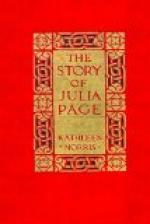“I see,” he said then, very quietly. “I’m sorry.”
And without another word he turned to the hall door and was gone. Julia stood still in the hall for a few minutes, curiously numb. All this was very terrible, very far reaching in its results, very important, but she could not feel it now. She did feel very tired, exhausted in every fibre of her body, confused and weary in mind. She put her head in the kitchen door only long enough to say that she was not hungry, and went upstairs to fling herself on her bed, grateful for silence and solitude at last.
To Jim the world was turned upside down. He could hardly credit his senses. His was not a quick brain; processes of thought with him were slow and ruminative; he liked to be alone while he was thinking. When he left Julia he went down to his club, found a chair by a library window, and brooded over this unexpected and unwelcome turn of events, viewing from all angles this new blow to his pride. He did not believe her protestations of a change of heart, nothing in his life tended to make such a belief easy. But her coldness and stubbornness hurt him and upset the plans he had been allowing to form of late in his mind.
All his life he had been following, with sunny adaptability, the line of the least resistance. Thrown out of his groove by the jealousy and resentment of the dark time in his married life, Jim had realized himself as fairly cornered by Fate, and had run away from the whole situation rather than own himself beaten. Rather than admit that he must patiently accept what was so galling to his pride, he had seized upon any alternative, paid any price.
And Germany had not been at all unpleasant. There was novelty in every phase of his home and public life; there was his work; and, for at least the first year, there was the balm for his conscience that he would soon be going home to Julia. He had allowed himself the luxury of moods, was angry with her, was scornful, was forgiving. He showed new friends her beautiful pictures—told them that she was prettier than that, no picture could do justice to her colour.
Among the new friends there had been two sweet plain Englishwomen: the widowed Lady Eileen Hungerford, and her sister, the Honourable Phyllis. These had found the rich young American doctor charming, and without a definite word or look had managed to convey to him the assurance of their warmest sympathy. They could only guess at his domestic troubles, but a hundred little half allusions and significant looks lent spice to the friendship, and Jim became a great favourite in the delightful circle the Englishwomen had drawn about them.
The midsummer vacation was spent, with another doctor, in Norway, and in September Jim went for a week or two to London, where Eileen and Phyllis, delicately considerate of the possible claims of the unknown wife, nevertheless persuaded him that he would be mad to decline the offer of the big German hospital. So back to Berlin he went, and in this second winter met old Professor Sturmer, and Senta, his wife.




